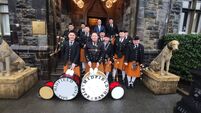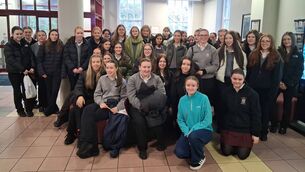KEUFC senior ladies defeat Real Tubber

Kilglass Enniscrone Utd senior ladies defeated Real Tubber in McSharry Park recently on a scoreline of 3-2.
The organising committee of the South Sligo Summer School are looking for self-catering accommodation and shared accommodation for next year's Summer School in Tubbercurry 14 - 20 July 2024. Contact the committee on 089 6111375 or email anseo@southsligosummerschool.com for details.
A consultation is taking place on November 30, in the Clayton Hotel on Active and Sustainable Transport in County Sligo. Transport is a critical issue across the entire community and for every generation in Sligo. While many current transport discussions are framed around important environmental and climate change implications, the issue of transport also has significant implications for access to healthcare, education, employment and social engagement.
Members of the Sligo PPN Secretariat are leading this consultation to find out what are the needs and challenges around transport in Sligo county, and what ideas the community have to solve some of the issues we are currently facing.
The feedback from the consultation will be used in a variety of ways by PPN representatives and also be available to all member groups. If access to appropriate transport affects the quality of life for you or people you know, then please come along and have your views recorded. Register at https://www.eventbrite.com/e/sligo-county-active-and-sustainable-transport-consultation-tickets- 757332119757?aff=oddtdtcreator or email ppn@sligococo.ie.
*****************
*********************
The leaves have fallen from the trees, the flowers are faded and gone. Nature is taking a rest and winter has come upon us. The four seasons are drawing to a close. Spring starts off with the rebirth of nature, buds come on the branches and grass begins to grow, summer sees it bloom, autumn sees it mellow and winter sees it fade back into the clay from whence it came.
People too have their spring. They grow into their prime in summer strong and full of life, mellow somewhat in middle age, and then grow old and pass away. Not all are that fortunate and make it through the four seasons of life.
In November the days are short the nights long, during which much time is spent indoors. November is the time when people pause and remember the past, those family members, friends and neighbours who have gone into eternity. Graves are tended, prayers are offered and those departed thought of and remembered in special ways. November was a scary month in the past. People were petrified of the dark and kept indoors. There were Seanachies that sat by the hob and told long ghost stories that frightened the wits out of young and old. They told of Droichead An Diabhal where the devil waylaid travellers at night, and tales of spirits roaming about and of the danger of meeting them if one was foolish enough to venture out.
Going back a hundred and five years a great war raged across Europe. 1918 on November 11, the great war came to an end. Millions of young men from all walks of life had died on the battle fields believing in one cause or another. Many left their homes thinking they were going to set the world right by joining up. Thousands of young Irishmen in 1915 and 1916 joined the British army and went to fight on Flanders fields, Mons and Chateau Thiery. Many died, some survived. Peace came on the 11th hour on the 11th day on the 11th month in 1918. It was a happy day for all living and bells rang out in cities round the world. Among those who died was one Thomas Kelly, of Drimina, Tourlestrane. He perished aboard a British naval vessel and was posthumously awarded the Bronze Memorial Medallion with the inscription ‘He died for freedom and honour’. His medallion is now on display in the Banada Tourlestrane Museum at Corpus Christi Village.
Another unfortunate casualty was that of a young man named Cunnane from the neighbouring village of Tullamoy, who died on the November 12, 1918, a day after the ceasefire. He had gone out for a peaceful walk the morning after and was shot by a German sniper who was said to be unaware of the ceasefire of the previous day. This war of four years brought sorrow, distress and loss to the homes of many and broke the hearts of fathers and mothers who saw their reared sons go forth never to return. They were remembered last week on Armistice Day amid pageantry when ceremonies took place. Those young men came from every parish and village in Ireland and many had little choice but answer the call as they were conscripted.
Their faded photos in uniform still grace many a mantlepiece in homes countrywide.
November weather-wise will be a bleak cold month with little activity outdoors, but it has another side, as it is the month before Christmas. The days will be taken up with promotions and activities, encouraging people to spend, spend, spend, as if there will be no tomorrow. The ‘throw thrift to the wind, eat, drink and be merry’, will be the mantra. Its ok to do so in moderation but to follow encouragement and ads on TV to the limit spells trouble. Not withstanding all that, work continues in the home, on the farm and factory. Life goes on nowadays regardless of the darkness.
Everything that grows out of the ground is there for a purpose. It is to be used in some form or other as something must die so that something else may live. The grass is there for the cow to graze in order to give milk, flies are there for birds to catch to feed their young and the rabbits were there for the fox and other carnivorous creatures to live on. At one time forty or fifty years ago, there were millions of them all over Ireland and they lived in large warrens. They eat the grass bare from fence to fence. Warrens existed in high dry fences and in dry sandy soil. Burrows were made in flat fields and horses and cattle when running about, broke legs and had to be put down.
Farmers were at their wits ends as to how to rid their fields of such a menace. During years of the second world war there was a demand for the rabbits in England as the English nation at war was hungry and short of food. Bands of young unemployed men in Ireland made a living on the rabbits. They went from farm to farm armed with white ferrets. They placed nets at the mouths of the burrows and put in the ferret. The ferret a harmless creature and didn’t kill the rabbits. The sight of them simply scared the daylights out of the rabbits. Ferrets were tame but they looked like stoats or weasels, and the scared rabbits ran out of the burrows in fear where outside they were trapped in the nets. After dispatch they were paunched, packed in a box and mailed to an agent who exported them to the English markets.
A good sized rabbit earned on average one shilling and sixpence and so young men made a living and farmers escaped from being eaten out of grass. With the end of the war, the rabbit trade died off and rabbit population grew at an enormous rate. Then a disease developed in Australia, came the way, and it spread like wildfire among rabbits. It was a cruel way of getting rid of them and it should never have been introduced. Foxes and other animals that lived on them had their food source wiped out. The food chain was broken and all the wild animals as feral cats, foxes and dogs had to go hungry or else find another source. They, then in turn centred on nesting birds, hares and other small animals. Now there is no curlew call, no grouse on the bog, no partridge in the fields. All that life has gone due mostly to the great break in the food chain. The wiping out of the cute little animals with the white tails caused a major upheaval.
*****************
**********************
The death took place at Sligo University Hospital on Monday, November 6, of Patrick (Pat) Tighe, Taverane, Cloonloo, in his 92nd year. Predeceased by his wife Mary Ellen on March 2, his brothers John and Terence and brother-in-law Tommy Oates. Pat’s remains reposed at the home of his daughter and son-in-law Martina and Gerry Mullen, Boyle, on Wednesday evening, November 8, and removed to St Joseph's Church, Cloonloo for Mass of the Resurrection on Thursday celebrated by Fr Joe Caulfield PP, Gurteen, with burial afterwards in Templeronan Cemetery.
Sincere sympathy is extended to his sons Francis, Gerard and John, daughter Martina, grandchildren and great-grandchildren, brothers Gerry and Ton, sister Mary and her husband PJ, sisters-in-law Molly, Breege, Marie and Phyllis and husband Gerry, daughter-in-law Yvonne, son-in-law Gerry, nephews and nieces and many friends. May he rest in peace.
Thanks all who contributed last Sunday to the collection for the upkeep and improvements of Mount Irwin Cemetery where a total of €726 was collected.
Gurteen Community Care are organising the Christmas Party for Sunday, December 3, in the Dapper Duck, Gurteen. Music will be by Mary Rose and Enda and doors will open at 1pm with dinner served at 2pm. To book your place telephone one of the following; Madeline at 086 3315713: Paddy 087 7870013: Pakie 086 2380375 or give the name into Gurteen Day Centre. Names need to be in by Monday, November 27.
The numbers drawn in the Gurteen Celtic lotto on Sunday night last were 18, 22, 23, and 28 and the winner of the €50 was Dorota Kosciolek, Gurteen. The jackpot will be €6,600 next week and the draw will be held in Donegans, Ragwood.





